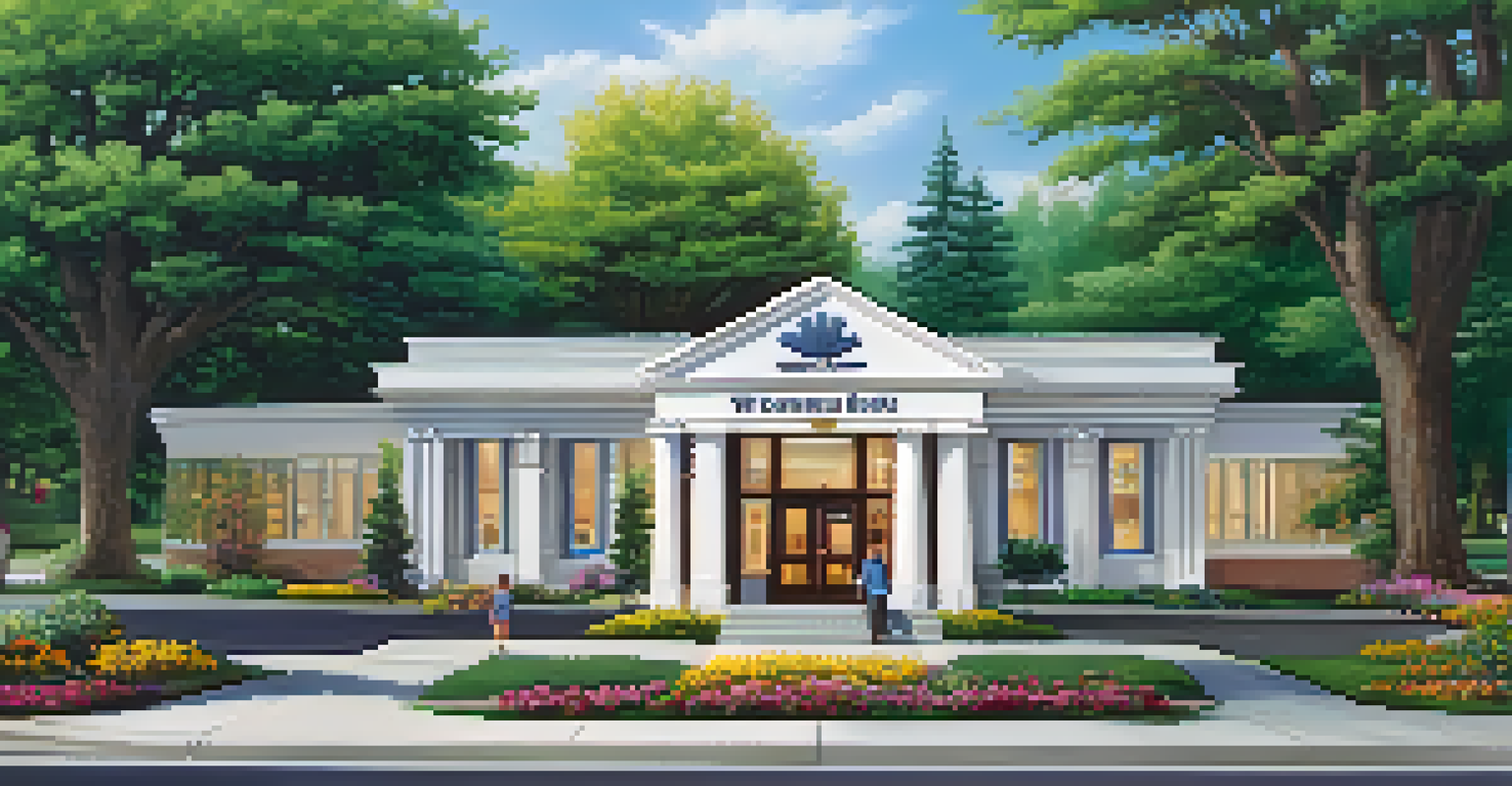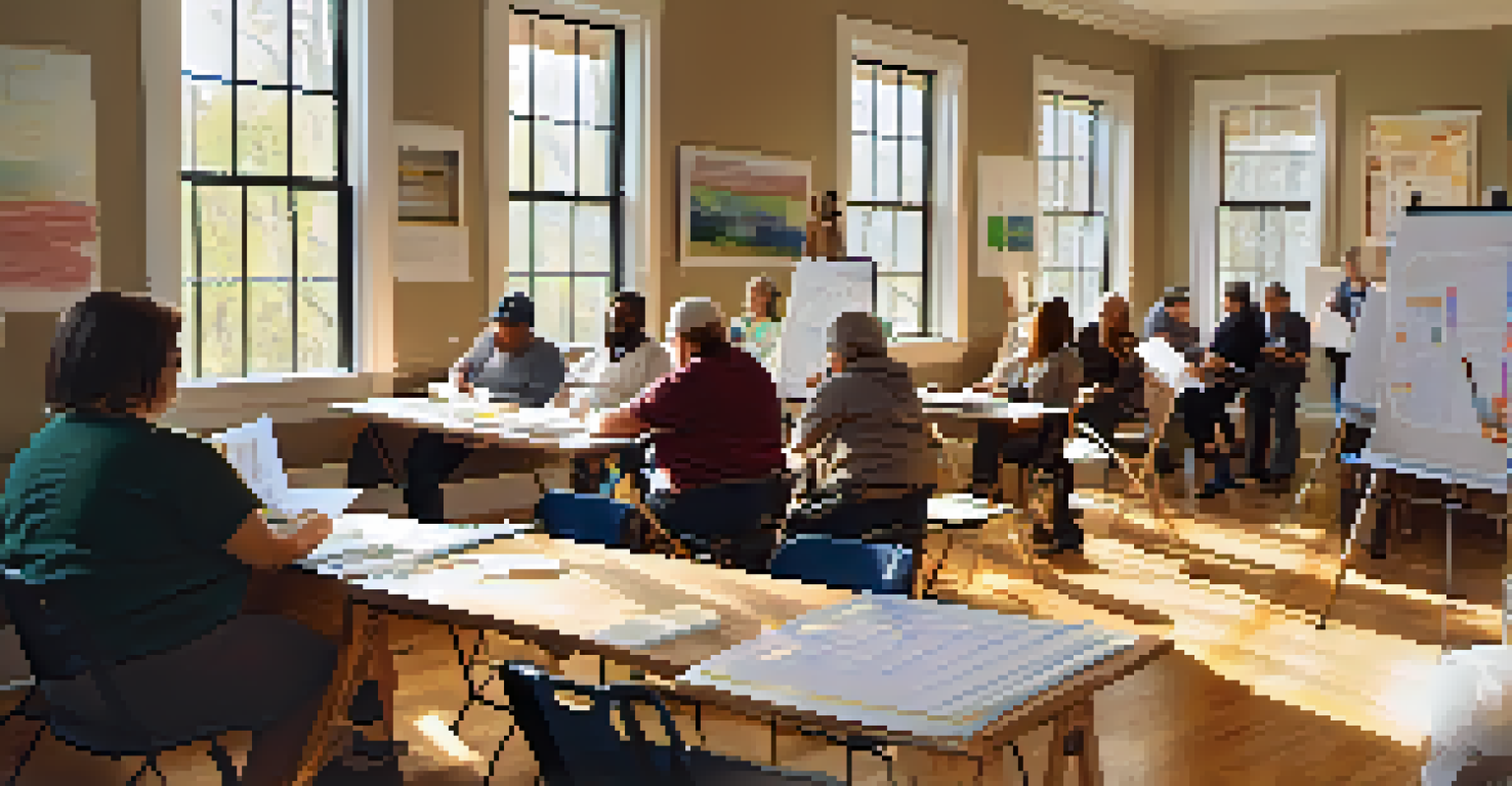How to Leverage Community Resources for Renovation Financing

Understanding Community Resources for Renovation Financing
When it comes to financing renovations, many homeowners overlook the wealth of community resources available to them. Community resources can include local government programs, nonprofit organizations, and even community banks that offer tailored financing options. These resources are often designed to support neighborhood revitalization and can provide financial assistance that traditional lenders might not.
Community resources are the backbone of successful renovations, providing support that goes beyond traditional financing.
By leveraging these resources, you not only gain access to potentially lower interest rates but also programs that might offer grants or forgivable loans. For example, many cities have initiatives aimed at improving housing conditions that can significantly lighten the financial burden of your renovation project. It's like having a financial safety net that’s specifically designed for your community needs.
In essence, understanding what community resources are available to you is the first step in your renovation financing journey. It’s important to do your research and identify programs that align with your renovation goals. This knowledge can empower you to make informed decisions and seize opportunities that might otherwise go unnoticed.
Exploring Local Government Programs for Financing
Many local governments offer renovation financing programs aimed at helping homeowners improve their properties. These programs can provide low-interest loans, tax incentives, or even direct grants for specific renovation projects. For instance, if you're looking to upgrade your home’s energy efficiency, local energy programs may offer incentives that help offset costs.

Take the time to visit your local government's website or contact their housing department to learn about available programs. Sometimes, these initiatives are not widely advertised, so being proactive can pay off significantly. Think of it as a treasure hunt—there are hidden gems waiting to be uncovered that can make your renovation much more feasible.
Utilize Community Resources for Renovation
Homeowners can access local programs, nonprofits, and community banks that provide tailored financing options for renovations.
Also, keep in mind that eligibility requirements can vary, so be sure to read the fine print. Some programs may target low-income households or specific neighborhoods, while others may be open to all residents. Understanding these criteria will help you determine which programs you can realistically apply for.
Utilizing Nonprofit Organizations for Financial Aid
Nonprofit organizations often play a crucial role in supporting community development and may offer financial assistance for home renovations. These organizations can provide resources ranging from low-interest loans to grants aimed at specific projects, like improving accessibility for seniors or disabled individuals. They are usually invested in community health, which means your renovation could align with their mission.
Alone we can do so little; together we can do so much.
To tap into these resources, start by researching nonprofits in your area that focus on housing, community development, or home improvement. Websites like Charity Navigator can help you find reputable organizations. One example is Habitat for Humanity, which not only helps build homes but can also assist with renovations for qualifying families.
Additionally, many nonprofits offer workshops and informational sessions to educate homeowners about available financing options. Attending these events can provide valuable insights and help you connect with resources that can make your renovation dreams a reality.
Engaging with Community Banks and Credit Unions
Community banks and credit unions often have a deep understanding of the local market and can offer personalized financing options that larger banks may not. These institutions are typically more flexible with their lending requirements and may provide lower fees. They might also offer renovation-specific loans that consider the potential increase in property value after the work is completed.
Building a relationship with your local bank can also lead to better rates and terms. By becoming a member or regular customer, you might gain access to exclusive offers or programs designed for community improvement. Think of it as a friendship—when you support them, they may be more inclined to support your renovation goals.
Explore Local Government Programs
Many local governments offer low-interest loans, grants, and incentives aimed at supporting home improvement projects.
Don’t hesitate to schedule a meeting with a loan officer to discuss your renovation plans. They can guide you through the specific products they offer and help you navigate the application process, making it less daunting. After all, a friendly face can make a world of difference in your financing journey.
Leveraging Home Equity for Renovation Projects
If you own your home, tapping into your home equity can be a smart way to finance renovations. Home equity loans and lines of credit allow you to borrow against the value of your home, often at lower interest rates than personal loans. This method is particularly attractive because the interest may be tax-deductible, depending on your situation.
Before you go this route, it’s essential to assess how much equity you have and how much you want to borrow. You can calculate your home equity by subtracting your mortgage balance from your home's market value. Knowing this information will help you make informed decisions about your financing options.
However, be cautious—borrowing against your home means you’re putting your property at risk. Make sure that your renovation plans will add value to your home, ensuring that the investment pays off down the line. It's a balancing act between risk and reward that every homeowner needs to consider.
Crowdfunding as a Modern Financing Option
In the age of digital connectivity, crowdfunding has emerged as an innovative way to finance home renovations. Platforms like GoFundMe or Kickstarter allow you to share your project and solicit funding from friends, family, and even strangers who resonate with your vision. This approach works particularly well if your renovation has a community benefit, such as creating a shared space or improving a neighborhood’s aesthetic.
To make your crowdfunding campaign successful, it’s crucial to tell a compelling story. Share your renovation goals, explain why they matter, and outline how the funds will be used. High-quality images and updates can engage potential backers and keep them invested in your project’s progress. Think of it as inviting people along for the ride—they want to see your journey unfold.
Crowdfunding for Renovation Support
Platforms like GoFundMe allow homeowners to share their renovation projects and raise funds from their community and beyond.
While crowdfunding can be a great way to gather funds, it also requires effort and transparency. You’ll need to maintain communication with your supporters and provide updates on how their contributions are making a difference. It’s a unique way to build community around your renovation and potentially gather support that extends beyond just financial contributions.
Collaborating with Local Organizations for Grants
Partnering with local organizations can unlock grant opportunities for your renovation project. Many nonprofits, foundations, and community groups offer grants specifically for home improvements, especially for projects that enhance community welfare. These grants can significantly reduce your out-of-pocket expenses, making your renovation more attainable.
To find potential collaborators, research organizations that align with your renovation goals. For instance, if your project focuses on energy efficiency, look for environmental organizations that may have funding available for such initiatives. Establishing a partnership can help you navigate the application process and increase your chances of success.

When applying for grants, be detailed and passionate in your proposal. Explain why your renovation matters not just to you, but to the community as a whole. A strong narrative can make a compelling case for why your project deserves funding, turning your renovation dreams into reality with the support of your community.